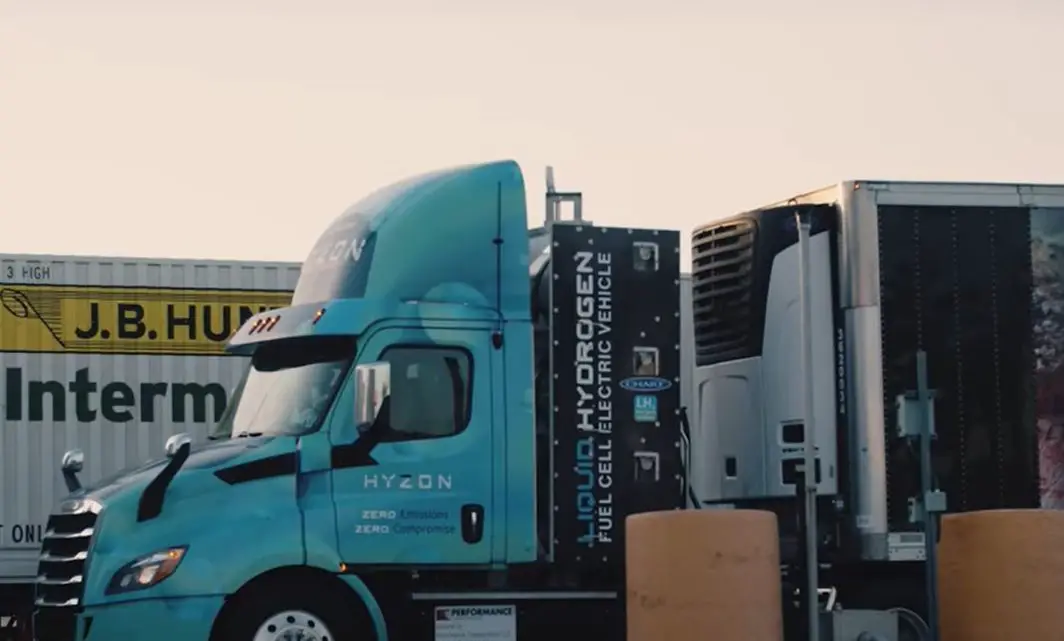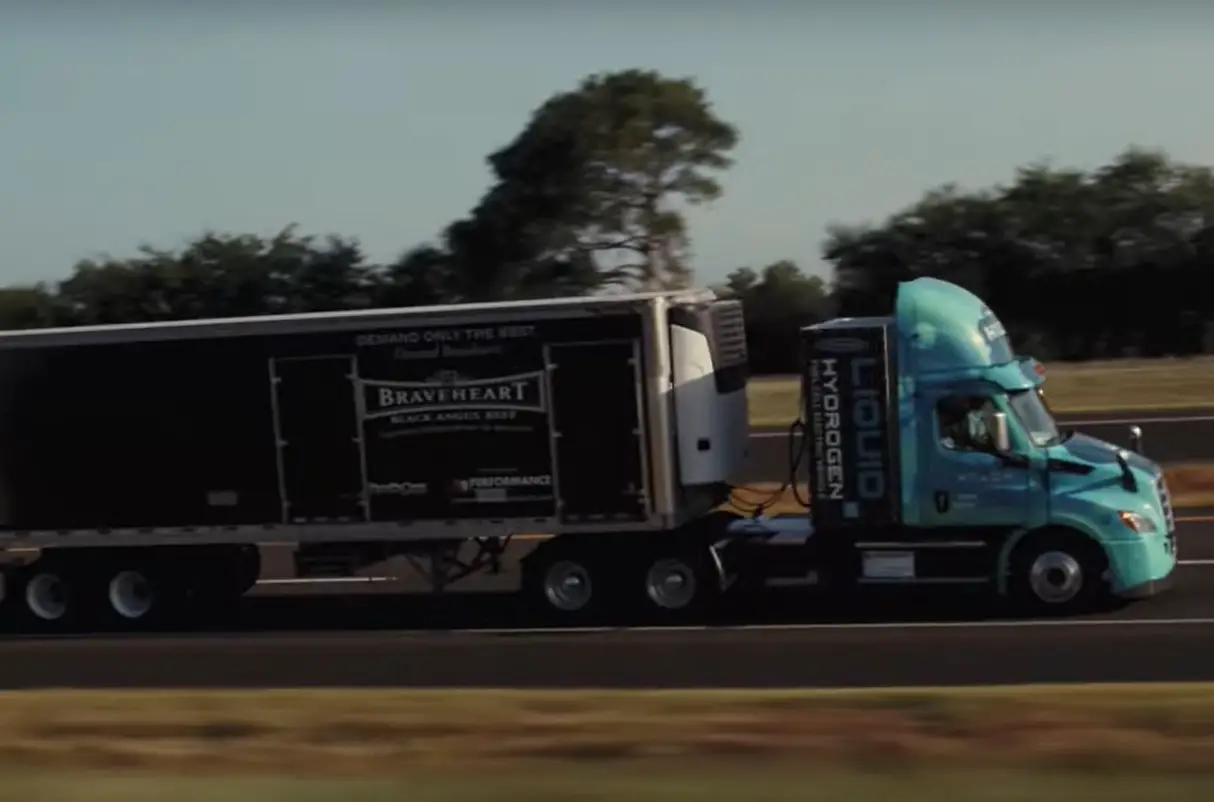
Hyzon’s 1st Liquid Hydrogen Electric Truck Wows in Demo
September 4, 2023The demo was carried out with Performance Food Group and Chart Industries.
Hyzon Motors Inc. (NASDAQ: HYZN), Performance Food Group, Inc. (NYSE: PFGC) and Chart Industries, Inc. (NYSE: GTLS) together announced that the first commercial run of Hyzon’s liquid hydrogen fuel cell electric truck (LH2 FCEV) was successfully completed, demonstrating viability of liquid H2 for commercial trucking applications and confirming diesel-comparable range potential.
The truck traveled over 540 miles on a 16-hour continuous run.
Hyzon Motor’s commercial demo of its liquid hydrogen fuel cell electric vehicle began its run in Temple, Texas and completed deliveries to eight Performance Food Group (PFG) customers near Dallas, Texas.
The liquid H2 truck traveled more than 540 miles in summer temperatures that climbed over 100-degrees Fahrenheit. Its continuous run took about 16 hours and was further than the distance from Sacrament to San Diego, California. The successful completion of the demo showed the viability of on-board liquid H2 to fuel long-distance, zero-emissions transport.
“With increased range and no added weight in comparison to our gaseous hydrogen trucks, we believe this liquid hydrogen demo run has demonstrated potential viability for the future of liquid hydrogen in commercial trucking,” said Hyzon Motor’s CEO Parker Meeks, in a recent company news release announcing the successful truck demo.
The long-distance range of the liquid hydrogen truck puts it on par with many diesel-powered trucks.
Meeks noted that once the liquid hydrogen truck is commercialized and powered by Hyzon’s proprietary 200 kilowatt fuel cell system, it “should be able to provide long distance range between 650 and 800 miles, on par with many diesel truck range requirements.”

When compared to gaseous hydrogen, liquid H2 has increased energy density, giving Hyzon the capability of significantly increasing the amount of fuel on board without having to make changes to the vehicles weight or payload.
Additionally, liquid hydrogen as a fuel source is about up to $5 per kilogram less expensive all-in to dispense than the more commonly used high-pressure gaseous hydrogen1. This lower expense is another perk for fleet owners seeing to decarbonize.
Hyzon developed a tank system with Chart Industries.
 To maintain hydrogen in an energy-dense liquid state, it must be stored at extremely cold temperatures of negative 400 degrees Fahrenheit. By partnering with Chart Industries, a global leader in manufacturing highly engineered equipment that services multiple applications in the clean energy and industrial gas sector, the companies developed a cryogenic tank system that was able to store liquid H2 at this extreme temperature and still deliver the hydrogen to the fuel cell system at the required pressure.
To maintain hydrogen in an energy-dense liquid state, it must be stored at extremely cold temperatures of negative 400 degrees Fahrenheit. By partnering with Chart Industries, a global leader in manufacturing highly engineered equipment that services multiple applications in the clean energy and industrial gas sector, the companies developed a cryogenic tank system that was able to store liquid H2 at this extreme temperature and still deliver the hydrogen to the fuel cell system at the required pressure.
“This is a meaningful accomplishment for the hydrogen ecosystem, as long-haul and heavy-duty transportation is a key end-use for liquid hydrogen. Our investment in our unique cryogenic liquid hydrogen onboard tank and our liquid hydrogen test facility support progress in the hydrogen industry, with the Hyzon and PFG road demonstration another key step in the evolution of hydrogen commercialization,” said Chart’s CEO and President Jill Evanko.
Liquid Hydrogen FAQ’s
1. What is liquid hydrogen?
Liquid hydrogen is the liquid state of the element hydrogen. It’s typically used as a concentrated form of hydrogen storage. As in any kind of hydrogen, it can be used to power vehicles.
2. How is liquid hydrogen used in trucks?
Liquid hydrogen is used as an alternative fuel source for trucks. It’s stored in tanks and then converted into electricity by a fuel cell system to power the vehicle’s motor.
3. Are liquid hydrogen-powered trucks environmentally friendly?
Yes, trucks powered by liquid hydrogen are environmentally friendly. The only byproduct of burning hydrogen in a fuel cell is water vapor, making these trucks a zero-emission vehicle.
4. What are the benefits of using liquid hydrogen in trucks?
Liquid hydrogen-powered trucks have several benefits. They produce zero emissions, contribute to reducing air pollution, and can potentially offer longer driving ranges compared to other alternative fuels.
5. How safe is liquid hydrogen for use in trucks?
Liquid hydrogen is generally safe for use in vehicles, including trucks. However, it must be handled and stored correctly due to its extremely low temperatures and high flammability. Modern hydrogen-fueled vehicles are equipped with numerous safety features to mitigate potential risks.
6. What is the current state of liquid hydrogen infrastructure for trucks?
The infrastructure for delivering and refueling liquid hydrogen is still developing. However, companies like Hyzon Motors are actively working on expanding the network of hydrogen refueling stations.
7. How does the performance of a liquid hydrogen truck compare to a diesel truck?
Liquid hydrogen trucks can match or even exceed the performance of diesel trucks in terms of torque and horsepower. Plus, they operate more quietly and smoothly.
8. Are there any drawbacks to using liquid hydrogen in trucks?
One of the main challenges with using liquid hydrogen in trucks is the current lack of refueling infrastructure. Additionally, storing liquid hydrogen requires very low temperatures, which can present technical challenges.
9. Are liquid hydrogen trucks cost-effective?
While the initial purchase price of a liquid hydrogen truck may be higher than a traditional diesel truck, the total cost of ownership could be lower due to reduced fuel and maintenance costs over the vehicle’s lifespan.
10. What does the future hold for liquid hydrogen trucks?
With increasing focus on reducing carbon emissions and improving air quality, the future looks promising for liquid hydrogen trucks. As the refueling infrastructure improves and costs continue to decrease, we can expect to see more of these vehicles on the road.




 With over 15 years of reporting hydrogen news, we are your premier source for the latest updates and insights in hydrogen and renewable energy.
With over 15 years of reporting hydrogen news, we are your premier source for the latest updates and insights in hydrogen and renewable energy.
Excited to see another Hydrogen project one step closer to fruiting! Toyota plans to deliver the first production Hydrogen FCEV truck powertrains in 2024 via their collaboration with PACCAR (Kenworth & Peterbilt).
Liquid hydrogen is necessary for internal combustion engine cars and trucks to run on hydrogen. Yes, there are challenges: “The fuel must be kept extraordinarily cold at -425 degrees Fahrenheit. That fuel has to be delivered by a particularly powerful and heavy electric fuel pump that cannot be lubricated by oil as not to risk the mixing of the super-cool liquid hydrogen and oil. Then, there’s the delicate challenge of refueling a liquid hydrogen tank.” (thedrive)
Toyota and Hyzon are dealing with these problems and they are learning a great deal from them. And what they are learning about liquid hydrogen can be applied not only to cars and heavy trucks, but also to airplanes — as well as commercial and military drones. Meanwhile, the other manufacturers are stuck on batteries — a technology that came first — but which was abandoned over a century ago.
Congratulations
Great Accomplishment
It’s about time the hydrogen has been used on a truck to prove that it’s as reliable as any other of powering a vehicle so stop faffing around get refuelling stations up and running and put hydrogen engines in car’s I’ll
test drive one any day and refuelling places in the UK is worse probably but I’m willing to be the test driver as long as it is filled with the driving aid I need as I am disabled and if it OK for me then it’s ok for none disabled people
From the craze I M H
Here in the UK, JCB the manufacturer’s of large diggers have redeveloped their diesel engines to use hydrogen successfully.